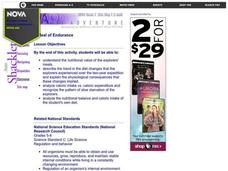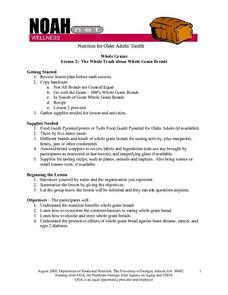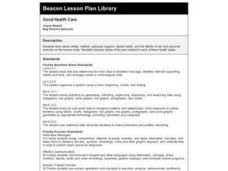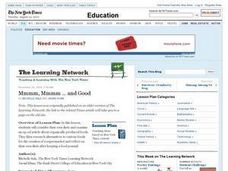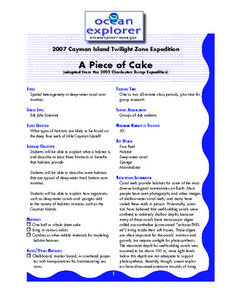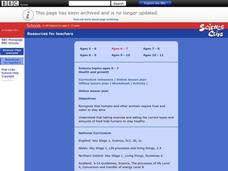Captain Planet Foundation
George Washington Carver and the Sweet Potato
Learn about George Washington Carver's important contributions to agriculture by studying the sweet potato. First graders read about the inventor's observations and prepare sweet potato slips for the class garden. Additionally, they...
University of Georgia
Energy Content of Foods
Why do athletes load up on carbohydrates the evening before a competition? The lesson helps answer this question as it relates the type of food to the amount of energy it contains. After a discussion, scholars perform an experiment...
Curated OER
Food Security/Insecurity
Young scholars gain awareness of global patterns of food distribution. They are introduced to the concepts of food security and food insecurity. Pupils investigate the nutritional status of others around the world using information...
Curated OER
A Meal of Endurance
Students examine the importance of the nutritional value of explorers' meals. They investigate the concepts of caloric intake vs. caloric expenditure and examine their own nutrition.
Curated OER
The Optimization of Food
Students discuss nutrition and how to make better choices with food. In this algebra and nutrition lesson, students discuss the way the body process food and the importance of nutrition for our cells. They discuss calories, fats and...
Curated OER
The Whole Trut about Whole Grain Breads
Students comprehend the nutrition benefits whole grain breads. They explore how to overcome the common barriers to eating whole grain bread. Students investigate how to choose and store whole grain breads. They comprehend the...
Curated OER
Forest Food Webs
Students consider the interdependency of life in a temperate forest by studying selected organisms from an Asian temperate forest and creating a food web.
Curated OER
Creeping and Crawling Observing Mealworms and Earthworms
Students observe the inherited traits in earthworms and mealworms. In this organisms lesson, students view a live mealworm and earthworm on a tray and identify the body parts. Students measure the worms and observe the behavior....
Curated OER
Good Health Care
Young scholars work in collaborative groups researching topics such as nutrition, the benefits of exercise on the body, dental and personal hygiene. They conduct interviews, create charts and posters, and report their results with a...
Curated OER
Mmmm, Mmmm ... and Good
Students consider their own diets and examine an op-ed article about organically produced foods. They research alternatives to various foods for the creation of a supermarket and reflect on their own diets after keeping a food journal.
Curated OER
Human Embryology
Ninth graders are introduced to the concept of human embryology. Individually, they complete an exercise in which they determine which trait they got from which family member. In groups, they identify and label the reproductive organs...
Curated OER
A Piece of Cake: Ocean Communities
Students explain habitats. In this model based lesson students create a model to help describe a habitat that is typical of deep-water. Students will describe how organisms such as coral and sponges add to their habitat.
Curated OER
CSI on the Deep Reef
Students read about, discuss, and research chemotrophic organisms. In this chemosynthesis lesson, students discuss the differences between photosynthesis and chemosynthesis. They learn that chemosynthesis includes a variety of chemical...
Curated OER
Arthropods at Home- Spider, Isopod, or Any Arthropod
Students design a habitat for an arthropod. In this organisms lesson, students read the book, A House is a House For Me. Students find an arthropod and create a terrarium.
Curated OER
Soil in My Food Web
Fourth graders understand the importance of soil to the food web. In this food web lesson, 4th graders create various food webs beginning with soil using yarn and name cards. Students write about the importance of soil to one...
Curated OER
Microbe Experimentation
Sixth graders conduct a microbe experiment. In this microbe lesson, 6th graders develop an experiment with micro-organisms, complete the associated worksheet, and complete a table showing the results.
Curated OER
Designing a Germination Experiment
Students explore botany by participating in a seed experiment. In this plant nutrition lesson, students define several science experiment vocabulary terms like observation, treatment, and replicate. Students utilize soaked seeds in a...
Curated OER
Best Breakfast Authors
Third graders write a story. For this breakfast authors lesson, 3rd graders write about a breakfast food and why it is a good selection. Students may illustrate stories and share with their peers.
Curated OER
My Favorite Breakfast Foods
First graders consider the importance eating breakfast. In this breakfast foods lesson, 1st graders plan meals, examine a variety of breakfast options, and discuss the food groups. Students taste a variety of foods. Extension activities...
Curated OER
Food Pyramid and Dietary Guidelines
Students examine Food Guide Pyramid and Dietary Guidelines. They look at samples of serving sizes, sort different foods into their correct groups, complete worksheets to discover which types of foods they eat regularly, and discuss...
Curated OER
Biotechnology, GMOs and Food
Twelfth graders explore controversy around genetically modified foods, identify source of controversy, and role play town hall meeting on genetically modified foods, to examine viewpoints and arguments for and against genetic modification.
Curated OER
Cows, Worms, and Compost
Young scholars study decomposition. In this decomposition lesson, students discuss the background information about decomposition. Young scholars then complete the 'Chew It Twice' worksheet.
Curated OER
Health and growth
Students examine ways for people to stay healthy, such as exercising and eating right.
Curated OER
Yo! Gert-making yogurt
Young scientists or chefs culture yeast to produce yogurt. The materials and a general description of how make yogurt are provided, but there is very little detail otherwise. You could use this as an activity when your biology class is...



